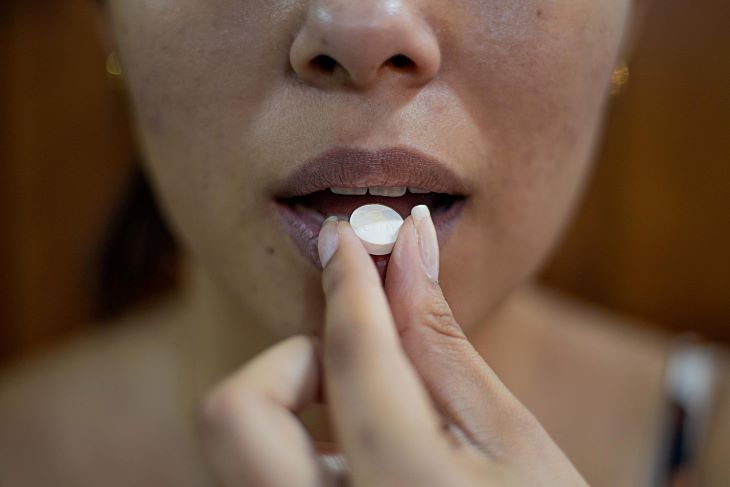Demerol Addiction: Symptoms, Treatment and Prevention
Quick links for Demerol Addiction: Symptoms, Treatment and Prevention
- How is Demerol Consumed?
- Is Demerol Addictive?
- What are the Symptoms of Demerol Addiction?
- How to Treat Demerol Addiction
- How To Prevent Demerol Addiction
- Recover Today From Demerol Addiction with Rehab Recovery
- References for Demerol Addiction: Symptoms, Treatment and Prevention
Demerol is a synthetic opioid pain medication.
While many people may know it as “Demerol”, this is only the brand name for the substance pethidine or meperidine.
The substance Demerol is used to treat patients who are suffering from moderate to severe pain.
It is a painkiller that is often compared to morphine.
How is Demerol Consumed?

Woman taking a Demerol pill
Demerol is often prescribed in the form of a 100 mg tablet.
Patients are typically instructed to take a Demerol tablet every 3 to 4 hours depending on their unique condition.
It is imperative that patients seek guidance from a medical professional before consuming Demerol.
It is also possible to consume Demerol in liquid form, such as in a medicated syrup.
However, getting the dosage right may be more difficult if you are measuring the liquidated Demerol by how it looks.
Demerol may be injected depending on the patient’s unique condition.
However, patients should only take these injections as instructed by a medical professional, because it can become habit-forming and addictive.
It is also possible to experience an allergic reaction to meperidine.
Patients suffering from malnutrition or asthma may suffer from breathing problems when consuming Demerol.
It is important to speak with your doctor before consuming Demerol.
Is Demerol Addictive?

Patient and addiction worker talking about Demerol addiction
Similar to morphine, Demerol can be highly addictive.
This is especially the case when taken in high quantities for an extended period of time.
Because of its rapid onset yet short-lived effects, [1] it makes the substance even more addictive than others.
These rapid onset but short-lived properties mean that the patient may quickly develop high tolerance to the substance.
As a result, they may need to consume higher quantities in order to feel the same effects as before.
This makes subjects more susceptible to developing a substance addiction.
Consuming high quantities of Demerol can produce a dopamine rush and feelings of euphoria which become addictive.
While dopamine is often associated with positive feelings, overstimulating these dopaminergic pathways can increase dependence and make it difficult to experience pleasure through natural activities.
Demerol is typically prescribed to patients who are suffering from short-term pain rather than long-term chronic pain.
For example, someone who has suffered a significant injury or is experiencing severe symptoms from an illness that can be treated with Demerol.
Consuming Demerol too frequently can lead to an addiction. Because of this, it is only used as a short-term pain remedy.
Someone suffering from chronic pain should not consume Demerol to relieve their pain because they will become too dependent on it.
Suddenly stopping your Demerol use or going against the guidance set by your doctor or physician may lead to withdrawal symptoms.
This is because your body has become accustomed to a certain amount of Demerol within it at all times,
What are the Symptoms of Demerol Addiction?

People taking notes and discussing Demerol addiction
Demerol, meperidine, or pethidine, is a psychoactive substance.
There are significant concerns that, in certain cases, the side effects of Demerol may outweigh the benefits. [2]
Some of the common withdrawal symptoms of Demerol addiction include:
Demerol is also thought to cause greater symptoms of nausea than morphine because of its higher levels of toxicity. [3]
Patients who self-medicate or consume high quantities of meperidine are more likely to suffer from meperidine-associated seizures. [4]
Seizures can be fatal.
Serotonin syndrome is also common among patients suffering from Demerol addiction.
This is because the body’s ability to naturally produce serotonin is affected by the overstimulation of substance use which releases serotonin, meaning that it becomes harder to produce serotonin without it.
How to Treat Demerol Addiction

Therapy session for Demerol addiction
There are many different ways to treat a substance addiction such as Demerol dependence.
While there are many ways to do so, the most optimal form of recovery is undergoing a professional addiction treatment programme at a drug and alcohol rehab.
At a drug and alcohol rehab, patients will undergo a comprehensive recovery programme that will incorporate a wide range of methods to combat their addiction.
At a drug and alcohol rehab, patients will have the chance to experience a vast range of treatment methods that target different facets of recovery.
Patients can enter a residential rehab as an inpatient, an intensive form of recovery which typically lasts around 28 days.
Alternatively, patients can undergo an outpatient treatment programme which is less intensive but takes place over a longer period of time.
1. Medical Detox
Patients will undergo a medical detox at a safe and comfortable facility as toxic substances withdraw from their bodies.
During this stage, patients will receive 24/7 medical supervision and support, and they may receive medication prescribed by an addiction physician.
These medications vary from antidepressants to substances that reduce the likelihood or severity of tremors or seizures.
One size does not fit all, as patients will undergo different medications according to their unique needs.
2. Therapy & Counselling at Rehab
After the detox, patients will be in a better physical and mental state to undergo therapy and counselling.
Popular forms of therapy and counselling at rehab include:
- Cognitive Behavioural Therapy: CBT is one of the most popular forms of therapy, not only for addiction but also for the treatment of mental health issues such as depression, bipolar disorder and anxiety. Sessions will take place with a licensed therapist in a 1-1 format to maximise personalisation and recovery benefits.
- Dialectical Behavioural Therapy: DBT is a form of CBT, but it focuses more on emotional management. Patients will learn skills related to mindfulness and meditation in order to help them cope with extreme emotions. DBT is particularly beneficial for patients suffering from mental health issues such as anxiety, PTSD, depression, bipolar disorder and more.
- Family Therapy: While the family has the power to facilitate recovery, they also have the potential to exacerbate addiction. It is important to reinforce the patient’s support network by educating their family members, improving lines of communication, and addressing toxic traits in order to make the home a suitable recovery environment.
- Holistic Therapy: Rather than simply talking in a 1-1 environment, Holistic Therapy can take many different forms and cater to the patient’s unique interests. Common examples of holistic therapy are music therapy, yoga, meditation, adventure therapy, art therapy and much more. Its purpose is to improve the physical, mental, and spiritual health of the patient.

Group working together to make a relapse prevention plan for Demerol addiction
3. Relapse Prevention Planning
Relapse prevention planning is a necessary component of rehab because it can help establish long-term recovery.
Patients will learn a range of relapse prevention planning methods, such as HALT, which stands for Hungry, Angry, Lonely and Tired.
This abbreviation stands for the emotional, mental, and physical relapsing [10] associated with substance addiction.
These methods help them recognise the signs of a potential relapse and ways they can turn towards positive and healthy coping mechanisms in difficult times.
4. Aftercare
Patients will receive further support following rehab in the form of aftercare.
Aftercare programmes typically include helpful resources, access to support groups and fellowship organisations such as SMART Recovery, AA or NA, as well as a motivational lifestyle structure such as the 12-Step programme.
How To Prevent Demerol Addiction

Individual therapy session in progress for Demerol addiction
While going to rehab and receiving addiction treatment is the most effective way to recover, there are still ways to minimise the chances of developing an addiction to any substance:
- Seek medical advice: Whenever you are suffering from an illness or injury that requires medication, it’s important that you seek medical advice from a doctor or a physician. Taking medication without the guidance of a medical professional will leave you susceptible to misuse and developing a dependence.
- Recognise your dependence: Try to understand why you may be susceptible to developing a dependence. Typically, people who are suffering from addiction also suffer from mental health issues such as anxiety or depression. Consider your mental health and lifestyle as potential factors in developing a dependence.
- Seek counselling: Whether or not you are suffering from an addiction or if you’ve been diagnosed with an illness, many people would benefit from counselling. People who are suffering from stress and anxiety related to the economy, their social environment, or other factors can benefit from counselling which can reinforce their health and resilience to dependence.
Recover Today From Demerol Addiction with Rehab Recovery

Person making a call looking for help with Demerol addiction
Contact Rehab Recovery today and we can combat addiction together.
We can use our expertise and experience in order to facilitate your recovery from substance dependence.
You can reach out to us by dialling the number 0800 088 66 86.
When you call us, you’ll be greeted by a friendly trained staff member from our team.
They will assist you by answering whatever questions you have about the addiction recovery process, and they can help you by conducting a free health assessment.
This can be done over the phone and in an instant.
The health assessment is a simple questionnaire where you’ll need to answer questions about your addiction history, medical history, mental and physical condition, preferences regarding rehab and more.
With our expertise and your motivation, we can overcome any addiction.
References for Demerol Addiction: Symptoms, Treatment and Prevention
[1] https://www.ncbi.nlm.nih.gov/pmc/articles/PMC3292527/
[2] https://www.ncbi.nlm.nih.gov/pmc/articles/PMC3733644/
[3] https://www.ncbi.nlm.nih.gov/pmc/articles/PMC6548151/




